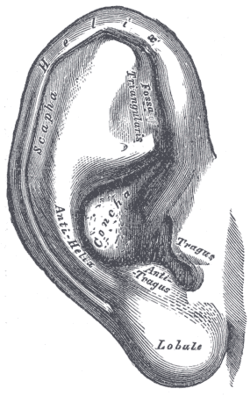Tragus (ear)
| Tragus | |
|---|---|
 The ear — lateral surface | |
| Details | |
| Identifiers | |
| Latin | Tragus |
| TA | A15.3.01.017 |
| FMA | 60998 |
The tragus is a small pointed eminence of the external ear, situated in front of the concha, and projecting backward over the meatus. It also is the name of hair growing at the entrance of the ear.[1] Its name comes from the Greek: tragos, goat, and is descriptive of its general covering on its under surface with a tuft of hair, resembling a goat's beard.[2] The nearby antitragus projects forwards and upwards.[3]
Because the tragus faces rearwards, it aids in collecting sounds from behind. These sounds are delayed more than sounds arriving from the front, assisting the brain to sense front vs. rear sound sources.[4]
In a positive fistula test (for the presence of a fistula from cholesteatoma to the labyrinth), pressure on the tragus causes vertigo or eye deviation by inducing movement of perilymph.[5]
Additional images
 Horizontal section through left ear; upper half of section.
Horizontal section through left ear; upper half of section.- External ear. Right auricle.Lateral view.
- External ear. Right auricle.Lateral view.
See also
References
This article incorporates text in the public domain from the 20th edition of Gray's Anatomy (1918)
- ↑ "Why do older men have hair growing in their noses and ears?" from The Straight Dope
- ↑ Webster. "Tragus : Meanining". Merriam-Webster. Retrieved 13 January 2013.
- ↑ "Tragus : Definition". Collins English Dictionary. Retrieved 13 January 2013.
- ↑ Muller, Raulf. "A numerical study of the role of tragus in the big brown bat". Research Gate. Retrieved 13 January 2013.
- ↑ "Fistula test". Harley Street E-Clinic. Retrieved 13 January 2013.
External links
- MedlinePlus Image 1126
- lesson3 at The Anatomy Lesson by Wesley Norman (Georgetown University) (externalear) (#7)